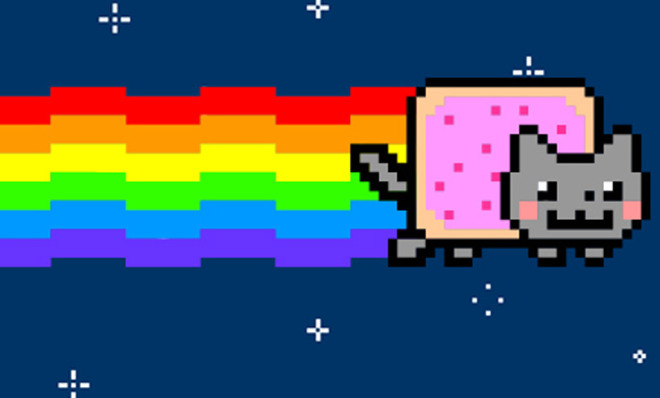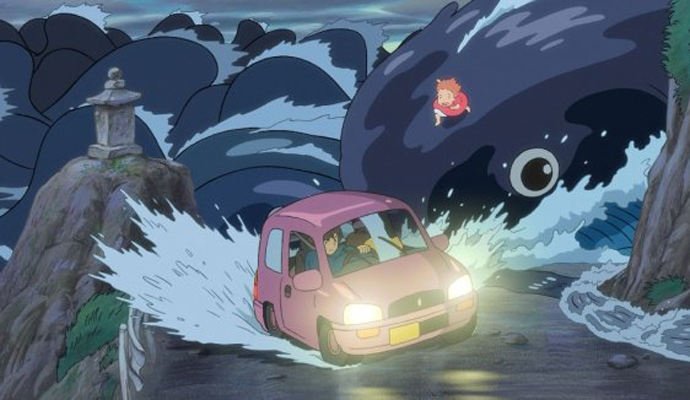How Japan won the internet
What is it about nyan cats and samurai?

A free daily email with the biggest news stories of the day – and the best features from TheWeek.com
You are now subscribed
Your newsletter sign-up was successful

If the internet had to assume an identity — if you were to sit down with the "internet" — it would be a messy-haired, foul-mouthed, aggressive, and impatient radical. The unimpeachable androgyne would attack you on subjects ranging from feminism to modern-day fascism. It'd know everything there is to know and be useless at dispensing the information. And if it had to assume a cultural identity, it would have to be Japanese.
The most casual look online will usually dig up something related to Japanese culture. Online forums are replete with references to manga, anime, themselves very recent phenomena in their home country. The phenomenon is so widespread it's causing trouble for itself. There are many Japanese people who feel their culture, one which claims the mortal importance of honor, is implicitly made fun of by being adopted naively by Westerners.
The issue, however, is never that simple. Foreigners and not just Westerners find an appeal in Japanese culture which is far from an obsession with puerile sexuality or the hyper-drama in manga and anime. Internet-users sympathize with Japanese culture, and then become obsessed with it. There's something in that.
The Week
Escape your echo chamber. Get the facts behind the news, plus analysis from multiple perspectives.

Sign up for The Week's Free Newsletters
From our morning news briefing to a weekly Good News Newsletter, get the best of The Week delivered directly to your inbox.
From our morning news briefing to a weekly Good News Newsletter, get the best of The Week delivered directly to your inbox.
Spirited Away
Studio Ghibli is today in Japan what Disney was to the West several decades ago: an artistic animated film studio built upon escapism and fairytales. While Disney's escapism was the frolicking of animals and plutonic fondling of princes and princesses, Ghibli does as the Japanese do: The films are tales of erratic and mischievous villains, cautious and softly-spoken schoolboys and girls and unpredictable magic.
The Japanese imagination is astounding. Take one Ghibli film: Ponyo, which was based on Disney's film The Little Mermaid. In The Little Mermaid, we see the effortless fusion of the legend of merfolk and a typical European setting. Ariel is stylized, beyond the bulbous eyes and trim figures true of all Disney's works.
Then look at Ponyo: To a sensitive Disney fan, the fable has been tortuously respun. The sea-witch is a goddess, her lover is a wizard. They are the parents of little Ponyo, one of a flock of fish-like princesses, who dreams of reuniting with a little boy she impulsively fell for. Their love threatens to flood the Earth and restore the Devonian era, until the mammoth Goddess intervenes.
A free daily email with the biggest news stories of the day – and the best features from TheWeek.com
Devonian era? Sock-puppet princesses? For some, that's an acquired taste. For others, however, it is the other-worldliness that makes the film so charming. Ghibli films are known for their ability to transplant you from the world you're living in to one strange and, importantly, magical. As we've written previously, no one appreciates this more than people who struggle in the real-world.

Made for this: Japan and the internet
It is very difficult to make accurate generalizations country-wide, but it can be said with certainty that social restraints in Japan are almost match-less across the world. The daily fear of keeping up with social mores is a struggle: remain polite, do not eat in front of others, observe formal and informal subtleties in language. Know your station: professionally, personally.
That repression doesn't come without its repercussions. Erratic pastimes are a staple export of Japanese culture. Japanese patriots want to see less of this, as it gives the wrong impression — as if Japan was really just a collective of strange and melodramatic individuals. It isn't what defines Japan by any means, but acts as a symptom of its rigid society.
The tendency for escapist art is also a symptom. Ponyo, the sock-puppet-like princess, is an exception to the rule that generally escapist protagonists are dull people thrown into extraordinary situations. They are virtuous according to what is "virtuous" in Japanese society: quiet, respectful, selfless. Their virtue is rewarded in the adventures they find themselves, the friends they make and the love they find.
It isn't a flattering comparison, but a true one: People who often shun "real-life" and adopt an online identity are similar to this stereotype of Japanese people. These people — wherever in the world they are — fear typical Western conventions of being assertive and independent. They don't like to stand out, struggle to express themselves and internalize negative feelings. The stress this causes them has few healthy outlets, one of them is escapism. And who, I ask, does escapist art better than the Japanese?
Online groups emit their own siren call. Social interactions which are not face-to-face, get simplified. Day-to-day prejudices of attractiveness, if you are anxious or nervous, are less obvious online than off. It gradually gets better: The more you socialize, the greater the name you make for yourself, the better that life seems to be. Until real-life could never match up to what's online.
These people colonize DeviantArt, Tumblr and Pinterest and load it with escapist niknaks: Disney princesses, Ghibli, anime, Manga, Harry Potter, Pokemon ad infinitum. Worlds far away which provide relief from one which is at times too challenging or too negative to live in everyday.
Of these niknaks, Japanese culture, is a goldmine. Ghosts, goblins, spirits, magic, talking cats, samurai: a code of honour, ritualised suicide, colourful armour. These things are so fantastical and strange, it gives people an escape who might want — or need — it.
And when the internet and Japanese culture collide, these people have that haven to explore worlds far away from the suppressed ones they inhabit, for whatever reason. So, yes: It's a shame for some that Japanese culture comes down to niknaks and samurai. But the strange and somewhat superficial interest in Japanese culture online is rooted in the need for solace.
More from The Kernel...